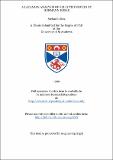Files in this item
A Lacanian analysis of selected novels by Hermann Hesse
Item metadata
| dc.contributor.advisor | Furness, Raymond | |
| dc.contributor.author | Gullatz, Stefan | |
| dc.coverage.spatial | 396 p. | en_US |
| dc.date.accessioned | 2018-05-16T15:36:48Z | |
| dc.date.available | 2018-05-16T15:36:48Z | |
| dc.date.issued | 1999-03 | |
| dc.identifier.uri | https://hdl.handle.net/10023/13353 | |
| dc.description.abstract | This dissertation takes the many existing, predominantly Jungian psychoanalytic approaches to Hesse as its starting point and then proceeds to an original recasting of some of Hesse's key novels (particularly Demian and Per Steppenwolf though a brief outline for Das Glasperlenspiel is provided in the concluding chapter) in the light of a Lacanian psychoanalysis and philosophy and a generally 'structuralist' understanding. My aim is to uncover how strategies of narrative signification in the complex architecture of Hesse's novels retroactively produce the spark of meaning which Jungians consider evidence of an intrinsic, archetypal essence at the core of the self. The Steppenwolf chapter in particular is also devoted to an investigation of the way in which meaning and mourning as functions constitutive of the subject crystallise in the use of metaphorical and allegorical devices. Lupton's After Oedipus: Shakespeare in Psychoanalysis which outlines a comprehensive paradigm for the interrelation of tropic narrative devices and their psychoanalytic undercurrents is a constant point of reference in this thesis, along with the works of Slavoj Žižek, arguably the most creative and influential contemporary Lacanian critic. | en_US |
| dc.language.iso | en | en_US |
| dc.publisher | University of St Andrews | |
| dc.subject.lcc | PT2617.E85Z5G9 | en |
| dc.subject.lcsh | Hesse, Hermann, 1877-1962. | en |
| dc.title | A Lacanian analysis of selected novels by Hermann Hesse | en_US |
| dc.type | Thesis | en_US |
| dc.type.qualificationlevel | Doctoral | en_US |
| dc.type.qualificationname | PhD Doctor of Philosophy | en_US |
| dc.publisher.institution | The University of St Andrews | en_US |
This item appears in the following Collection(s)
Items in the St Andrews Research Repository are protected by copyright, with all rights reserved, unless otherwise indicated.

